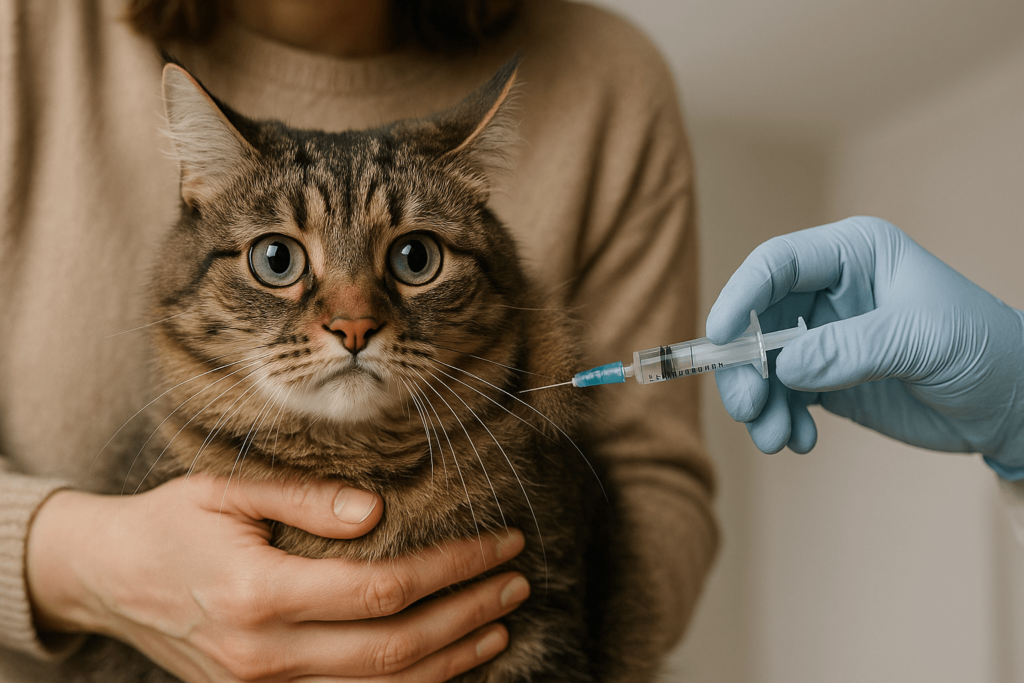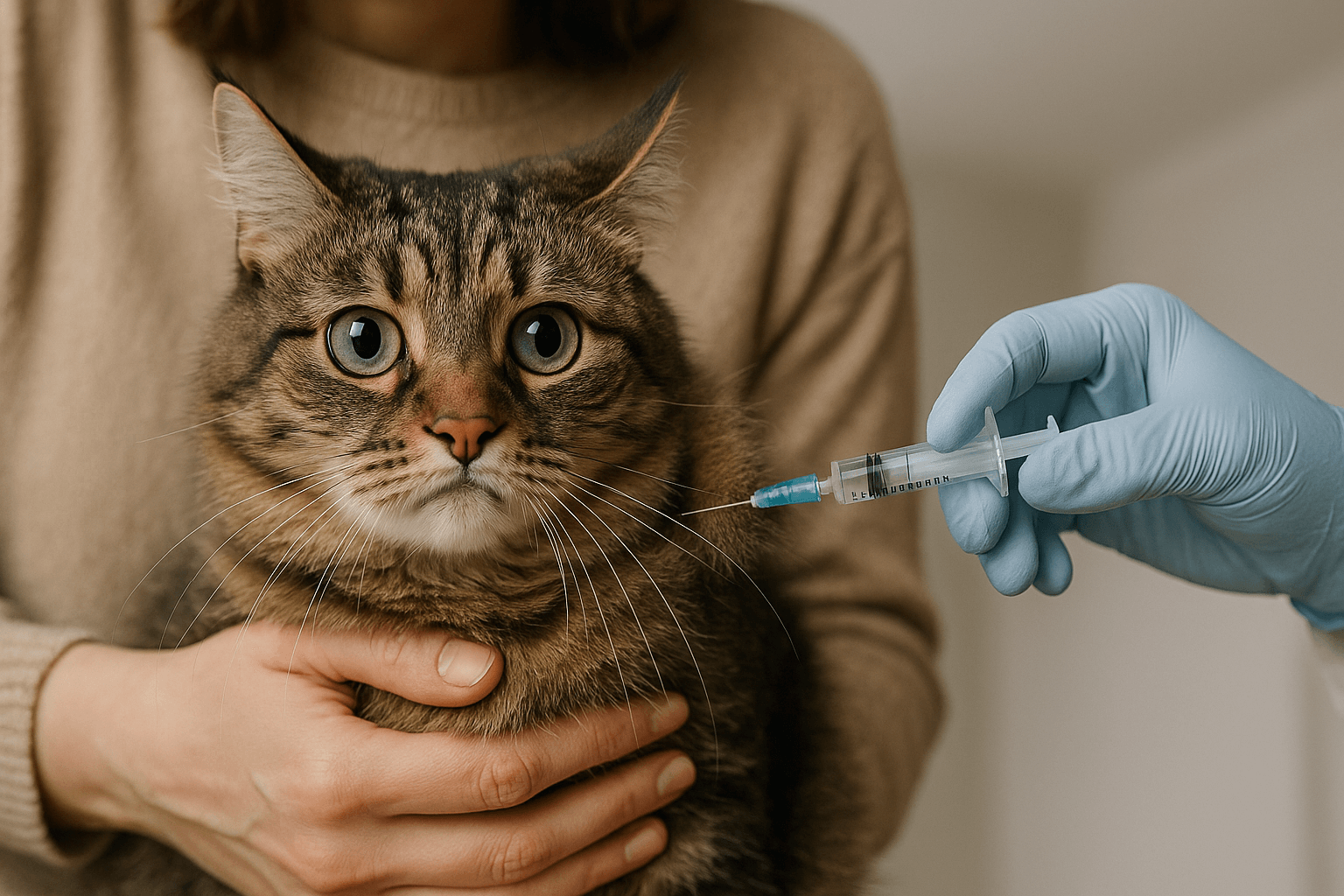Cat Reactions to Vaccines: What Every Pet Owner Should Know
Vaccinations are a crucial part of keeping your cat healthy and protected from serious diseases. However, like any medical intervention, vaccines can sometimes cause reactions in cats. While most reactions are mild and temporary, it’s important for pet owners to understand what to expect and how to respond if their feline friend experiences discomfort after vaccination. In this blog post, we’ll explore common cat reactions to vaccines, how to identify them, and what steps you can take to ensure your cat remains safe and comfortable throughout the process.
Common Mild Reactions to Cat Vaccines
Most cats experience only minor side effects after receiving vaccines, which typically resolve on their own within a day or two. These mild reactions are normal and indicate that the immune system is responding to the vaccine.
Soreness at the Injection Site:
Your cat may feel tenderness or swelling where the vaccine was administered. This is usually temporary and resolves without intervention.Lethargy or Fatigue:
Cats may appear less energetic than usual as their body works to build immunity. Rest is often all they need to recover.Mild Fever:
A slight increase in body temperature is a natural response to vaccination and should subside within 24-48 hours.Loss of Appetite:
Some cats may eat less than usual for a short period. Encourage hydration and offer their favorite food to entice them.Sneezing (Intranasal Vaccines):
If your cat received an intranasal vaccine, mild sneezing or nasal discharge may occur but should clear up quickly.
While these reactions are generally harmless, monitoring your cat closely ensures they return to normal promptly.

Signs of Severe Vaccine Reactions in Cats
Though rare, some cats may experience severe reactions to vaccines. Recognizing these symptoms early is critical for seeking prompt veterinary care.
Facial Swelling:
Swelling around the face, eyes, or muzzle can indicate an allergic reaction requiring immediate attention.Difficulty Breathing:
Labored or rapid breathing may signal a serious allergic response or anaphylaxis, which needs urgent treatment.Persistent Vomiting or Diarrhea:
Gastrointestinal upset lasting more than a day could suggest a more serious issue linked to the vaccine.Collapse or Weakness:
Sudden weakness or collapse is a red flag and warrants an emergency vet visit.Hives or Rash:
Raised bumps or itching across the skin may point to an allergic reaction that requires medical intervention.
If you notice any of these signs, contact your veterinarian immediately to ensure your cat receives appropriate care.
Check this guide 👉Can I Give My Cat Vaccines Myself? Best 7 Expert Tips!
Check this guide 👉How Much Are Cat Vaccines? Best 7 Health Tips!
Check this guide 👉Understanding the FVRCP Cat Vaccine: Best 7 Health Tips!
Mild Vaccine Reactions | Severe Vaccine Reactions |
|---|---|
Soreness at injection site | Facial swelling |
Lethargy or fatigue | Difficulty breathing |
Mild fever | Persistent vomiting or diarrhea |
Loss of appetite | Collapse or weakness |
Sneezing (intranasal vaccines) | Hives or rash |
How to Minimize Vaccine Reactions in Cats
While you can’t completely eliminate the risk of vaccine reactions, there are steps you can take to reduce the likelihood and severity of adverse effects.
Provide a Calm Environment Post-Vaccination:
Keep your cat in a quiet, stress-free space after their appointment to help them rest and recover.Monitor for Symptoms Closely:
Observe your cat for any unusual behavior or physical changes in the hours and days following vaccination.Avoid Over-Vaccination:
Work with your vet to create a tailored vaccine schedule based on your cat’s age, lifestyle, and health status.Stay Hydrated and Nourished:
Ensure your cat has access to fresh water and encourage them to eat, even if their appetite seems reduced.Discuss Pre-Medication Options:
For cats with a history of allergic reactions, your vet may recommend pre-treatment with antihistamines or other medications.
Taking these precautions can help minimize risks and keep your cat comfortable during and after vaccinations.
When to Contact Your Veterinarian About Vaccine Reactions
Knowing when to seek professional help is key to ensuring your cat’s safety after vaccination. Here are some scenarios where contacting your vet is essential.
Prolonged Symptoms:
If mild reactions persist beyond 48 hours, consult your vet to rule out complications.Unusual Behavior Changes:
Significant shifts in behavior, such as aggression or extreme lethargy, warrant further investigation.Swelling That Worsens:
Increasing swelling at the injection site or elsewhere on the body should not be ignored.Refusal to Eat or Drink:
A complete lack of interest in food or water for more than 24 hours is concerning and requires attention.Bleeding or Discharge:
Any abnormal bleeding, pus, or discharge from the injection site needs prompt evaluation by a vet.
Timely communication with your veterinarian ensures your cat receives the care they need to recover fully.
Factors Influencing Vaccine Reactions
Several factors can influence how a cat reacts to vaccines, ranging from genetics to environmental conditions. Understanding these variables helps pet owners prepare for potential outcomes.
Age of the Cat:
Kittens and senior cats may have weaker immune systems, making them more susceptible to adverse reactions.Overall Health Status:
Cats with underlying health issues may experience stronger reactions compared to healthy individuals.Previous Reaction History:
Cats who’ve had negative reactions in the past are more likely to experience them again.Type of Vaccine Administered:
Certain vaccines carry higher risks of side effects than others, depending on their formulation.Stress Levels During Vaccination:
High-stress environments can exacerbate reactions, highlighting the importance of calm handling.
By considering these factors, you can better anticipate and manage your cat’s response to vaccines.
Supporting Your Cat’s Recovery Post-Vaccination
After vaccination, providing proper care and support aids your cat’s recovery and minimizes discomfort. These tips ensure a smooth healing process.
Offer Comfortable Resting Spaces:
Provide soft bedding and quiet areas where your cat can relax undisturbed.Encourage Gentle Activity:
Allow light play or movement to prevent stiffness without overexertion.Check the Injection Site Daily:
Inspect for unusual swelling, redness, or discharge to catch problems early.Maintain a Stress-Free Home Environment:
Avoid loud noises or sudden changes that could disrupt your cat’s recovery.Reward Calm Behavior:
Use treats or affection to reinforce relaxed behavior during the recovery period.
With attentive care, your cat will bounce back quickly and regain their playful spirit.
Alternatives to Traditional Vaccination Protocols
For cats prone to vaccine reactions, alternative protocols or strategies may offer safer options. These approaches prioritize your cat’s unique needs while maintaining disease protection.
Titer Testing Instead of Booster Shots:
Titer tests measure antibody levels to determine if additional vaccines are necessary, reducing over-vaccination risks.Splitting Vaccine Doses:
Administering one vaccine at a time instead of multiple shots in a single visit lowers the chance of overwhelming the immune system.Non-Core Vaccine Exemptions:
Discuss with your vet whether certain non-core vaccines are truly necessary for your cat’s lifestyle.Homeopathic Remedies for Support:
Some pet owners use homeopathic treatments under veterinary guidance to ease vaccine-related discomfort.Delayed Vaccination Schedules:
Spacing out vaccines over longer intervals allows the immune system more time to recover between doses.
Exploring these alternatives provides flexibility and peace of mind for cat owners concerned about vaccine safety.
Frequently Asked Questions About Cat Reactions to Vaccines
Are vaccine reactions common in cats?
Most cats experience only mild reactions, while severe reactions are rare but possible.
How long do vaccine reactions last?
Mild reactions typically resolve within 24-48 hours, though persistent symptoms should be evaluated by a vet.
Can I prevent vaccine reactions entirely?
While prevention isn’t guaranteed, working closely with your vet reduces risks significantly.
Should I stop vaccinating my cat if they react?
No, but discuss alternative schedules or options with your vet to balance protection and safety.
What should I do if my cat has a severe reaction?
Seek emergency veterinary care immediately to address the issue and stabilize your cat.
Prioritizing Your Cat’s Health After Vaccination
Understanding cat reactions to vaccines empowers you to make informed decisions about your pet’s healthcare. While most reactions are mild and manageable, staying vigilant and proactive ensures your cat remains safe and healthy. By partnering with your veterinarian and following best practices, you can provide your feline companion with the protection they need while minimizing potential risks. Remember, every step you take toward caring for your cat contributes to their long-term well-being—and that’s something worth celebrating.
Canned Pumpkin for Cat Diarrhea: Best 7 Expert Tips! Natural remedy to firm stools, soothe upset bellies, and support gut health safely.
Can a Cat Give You Scabies? Best 7 Expert Tips! Discover the truth about feline mites, human skin risks, and how to protect yourself—without panic.
Cat Flea vs Human Flea: Best 7 Expert Tips! Discover the truth about bites, species, and how to eliminate infestations for good.
Weird Cat Behaviors: Best 7 Expert Tips! Discover why cats do strange things—and how to understand, not punish, their instincts for a happier home.





